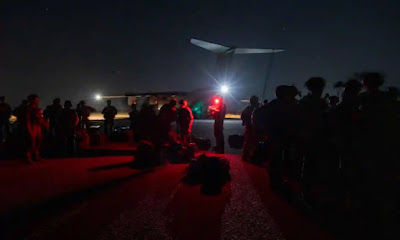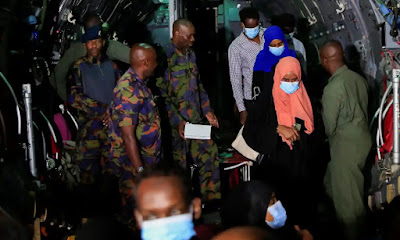Dated Wednesday 7 June 2023 - full copy:
Briefing on Cooperation between the UN and the League of Arab States
Tomorrow morning (8 June) the Security Council will convene for a briefing on cooperation between the UN and the League of Arab States (LAS).
The meeting, which is one of the signature events of the June Council Presidency of the United Arab Emirates (UAE), will be chaired by Khalifa Shaheen Almarar, Minister of State at the UAE’s Ministry of Foreign Affairs and International Cooperation.
The expected briefers are Under-Secretary-General for Political and Peacebuilding Affairs Rosemary DiCarlo; LAS Secretary-General Ahmed Aboul Gheit; and Dr. Omnia El Omrani, who was the Youth Envoy for the President of the 27th Conference of the Parties to the UN Framework Convention on Climate Change (COP 27), held in Sharm El-Sheikh in 2022.
It appears that Egypt (on behalf of the Arab Group at the UN) will participate under rule 37 of the Council’s provisional rules of procedure.
Strengthening partnerships and cooperation with regional and sub-regional organisations—as envisioned in Chapter VIII of the UN Charter—has become an increasingly prominent theme for the Security Council.
The Council has held annual consultative meetings with the AU Peace and Security Council (AUPSC) since 2007 and has received regular briefings from the EU since 2010.
It has also held debates and briefings on cooperation with several other bodies, including the Association of Southeast Asian Nations (ASEAN) and the Organization for Security and Co-operation in Europe (OSCE).
In the past decade, LAS representatives have addressed the Council on several occasions, not least due to the proliferation of conflicts in the Arab world.
In recent years, Arab Council members have featured meetings on the UN-LAS relationship as signature events of their presidencies, including Kuwait in June 2019, Tunisia in January 2021, and the UAE in March 2022. Presidential statements focusing on the relationship between the two organisations were the outcome of these three meetings.
The UAE has circulated a concept note in preparation for tomorrow’s meeting, indicating that the briefing is an opportunity to explore expanding joint efforts to address the interrelated peace, security, and humanitarian challenges facing the Arab region. It poses several questions to help guide the discussion, including:
- How can the Security Council and the LAS enhance their collaboration to promote tolerance, peaceful coexistence, and human fraternity, while aligning their approaches across the peace continuum, from conflict prevention to post-conflict peacebuilding?
- What challenges do donor coordination efforts face in the context of emergency humanitarian crises, and how can the UN and the LAS work together to improve the effectiveness and efficiency of aid delivery in such situations?
- How can the contributions of women and young people in peacebuilding be better acknowledged and supported by the Security Council and the LAS? What actions can be taken to improve the meaningful involvement of women and youth in peace and security initiatives in the Arab region?
At tomorrow’s meeting, Council members are expected to underscore the contributions of regional organisations to international peace and security. They may reflect on how the UN and the LAS can work together more effectively across the “peace continuum”, ranging from conflict prevention to post-conflict peacebuilding. Building on themes discussed in the concept note, members may also speak about cooperation between the UN and the LAS in promoting the rights of women and youth in the region.
In this regard, some may emphasise the importance of implementing the 2022 “Arab Declaration to Combat All Forms of Violence Against Women and Girls”, including through partnership with UN Women. They might also offer their views on the “Arab Strategy on Youth, Peace and Security”, which is expected to be launched later this year and has been developed with assistance from the UN Liaison Office to the LAS, which was established in 2019 in Cairo. Some members may talk about efforts to combat terrorism in the Arab world, including the Arab regional counter-terrorism strategy adopted in March 2022.
There could also be discussion of the adverse effects of climate change in the region and how to address them. It appears that this issue may be a focus of El Omrani’s briefing. The Council has also recognised the negative impact of climate change and other environmental factors in resolutions on one peace operation in the Middle East, the UN Assistance Mission for Iraq (UNAMI). In resolution 2682 of 30 May, which most recently renewed UNAMI’s mandate for one year, the Council called on the mission to advise, support, and assist the Iraqi government in facilitating regional dialogue and cooperation on several issues, including the “adverse impacts of climate change in particular those contributing to desertification and drought, resilience building, infrastructure, public health, and refugees”.
There is also likely to be discussion at tomorrow’s meeting of how the UN and the LAS can more effectively address security and humanitarian challenges in several country situations on the Security Council’s agenda. During the 32nd summit of the LAS in Jeddah on 19 May, the participants referred to several of these situations when they issued the “Jeddah Declaration”, which:
- stressed the importance of intensifying efforts to achieve a comprehensive and just settlement to the Palestinian issue;
- expressed deep concern at the ramifications of the crisis in Sudan for the security, safety, and stability of LAS countries and people;
- welcomed the decision of the Arab League Council to resume the participation of Syria in LAS meetings; and
- advocated for the ongoing UN and regional efforts to come up with a comprehensive political solution to the crisis in Yemen.
Council members have traditionally held contrasting views about how to approach many of the peace and security challenges in the Arab world. This is illustrated by the frequent vetoes cast over the years by the US and Russia on resolutions regarding the Israeli-Palestinian conflict and Syria, respectively. In recent months, while some Council members—such as Russia and the UAE—have supported efforts to normalise relations with Syria, others, including the UK and the US, have remained sceptical.
[Ends]






